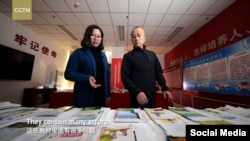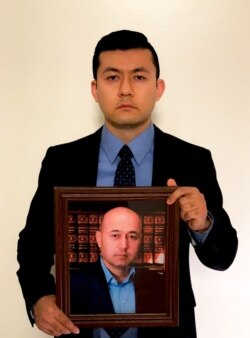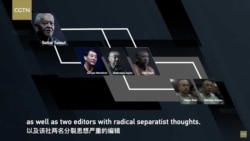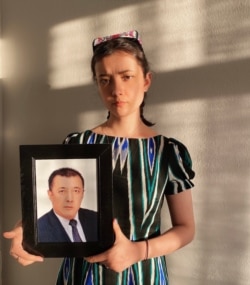Family members of former Uyghur textbook editors accused of incorporating ethnically charged and separatist views into classroom literature say a recent documentary on the topic produced and broadcast by a pro-Beijing media company grossly misrepresents them.
Last month, the state-run China Global Television Network aired a 10-minute documentary, Challenges of Fighting Terrorism in Xinjiang: The Textbooks, accusing former Uyghur publishing officials and senior editors such as Yalqun Rozi, editor of the Xinjiang Education Press, of incorporating extremist “separatist thoughts” into children's educational materials as early as 2003.
“I learned those textbooks as a kid,” said Kamalturk Yalqun, the son of the now-imprisoned Yalqun, who described last month's broadcast as more evidence of Beijing’s efforts to mask its brutal campaign against the mostly Muslim Uyghurs as a response to a burgeoning domestic terror threat.
“Reading them was purely a happy literary adventure for me and there was nothing to incite hatred or radicalism,” said Yalqun, who came to the U.S. to pursue graduate studies in 2014.
He has not heard from his father since his October 2016 arrest by Xinjiang authorities.
“I almost failed to recognize when I first saw his photo displayed in the film," Yalqun told VOA. "Clearly, there had been physical torture.”
'Toxic' textbooks
In the 10-minute film, which aired April 2, CGTN claims that Sattar Sawut, the former director general of Xinjiang Education Department, had formed a “criminal gang” of six Uyghurs — his deputy, Alimjan Memtimin, two former Uyghur heads of Xinjiang Education Press, Abdurazaq Sayim and Tahir Nasir, and two senior editors, Yalqun Rozi and Wahitjan Osman — to spread extremist ideas to 2.3 million Uyghur students who studied “the problematic” textbooks.
According to Chinese media, the six Uyghur officials in 2017 were charged with attempting “to split the country”; Sawut was reportedly given a death sentence with a two-year reprieve, while three other officials received life sentences, and the two editors received 15 years each.
Abduweli Ayup, a Norway-based Uyghur linguist and rights activist, said the textbooks were originally developed under Beijing’s campaign of “suzhi jiaoyu" or "education of personal quality."
“Some senior Chinese officials who worked on reviewing the textbooks were never mentioned in the documentary while their six Uyghur counterparts were singled out as separatist criminals is evidence that this is a sham trial,” Ayup told VOA.
Seven copies of 22 purportedly “toxic” Uyghur textbooks obtained by VOA list names of both Uyghur and Chinese officials responsible for vetting the contents.
The textbooks introduce China as “the motherland” of all “56 ethnic groups,” including both Uyghurs and Chinese. They also highlight essays of leading modern Chinese writers such as Lu Xun and include hagiographies of prominent Chinese figures.
A sixth-grade literature textbook featured Uyghur translations of two Chinese stories, "Remembering my father, Li Dazhao," and "Overnight Work," about early Chinese communist leaders Li Dazhao and Zhou Enlai.
Zhao Lijian, Chinese Foreign Affairs Ministry spokesperson, said last month CGTN documentaries showed that Beijing’s campaign in Xinjiang is “counter-terrorism and de-radicalization.”
To the families of the former Uyghur officials, though, China’s accusations are inconsistent, given that those same officials were awarded for the same work.
Aykanat Wahitjan, the daughter of Wahitjan Osman, a former senior editor accused in the film, said state media in the past broadcast her father’s award ceremony for his “extraordinary literary work."
“In 2012, China awarded my father with its 10th Junma Award, a national literary award for his outstanding literary work," Aykanat, an economics student in Istanbul, told VOA. Now, she said, "years later, the same [government] broadcasts that my father committed a crime because his literary work ‘provoked ethnic hatred.’”
Purporting to offer evidence that the textbooks promote “ethnic hatred against Chinese soldiers and separatism,” Beijing's documentary highlights the legendary story of seven Uyghur girls who resisted Manchu soldiers during the Qing empire conquest of the region in the 18th century. The documentary also features a picture of a 20th century Uyghur leader, Ehmetjan Qasimi, who had the star-and-crescent emblem of East Turkestan Republic on his left jacket chest and reports it as a symbol of separatism.
“The actual text [taken from the textbook] in the video itself clearly says ‘Manchus.’ This shows that this is a story from the Qing empire, before Han [Chinese] soldiers were present in Xinjiang,” said James Millward, a professor of Chinese history at Georgetown University, adding that the voice-over about the seven Uyghur girls is thus a clear lie, as shown by the documentary footage itself.
According to Millward, outlawing the textbooks is a part of China’s recent effort to alter the historical narrative of key events and actions by Uyghur leaders.
“Most English-speaking viewers will not see why the picture of Ehmetjan Qasimi and his medal is offensive or dangerous — because it isn't, it is simply an historical image,” said Millward.
Qasimi led the East Turkestan Republic and controlled what is now northern Xinjiang in the 1940s. He entered a treaty with China’s then-ruling Kuomintang to co-govern Xinjiang after the 1945 Sino-Russian Friendship Treaty. When Qasimi mysteriously died in a plane crash in 1949, the founder of People’s Republic of China, Mao Zedong, praised him as “worthy of the eternal memory of all Chinese people.”
Millward charged that Qasimi had been mentioned in official Chinese history books for nearly 70 years, which became forbidden only under President Xi Jinping.
China's crackdown against Uyghurs has been raised to higher level since August 2016 when Xi appointed Chen Quanguo, a former Tibet party chief, to be Chinese Communist Party secretary of the Xinjiang Uyghur Autonomous Region. Chen’s administration has since been accused of holding over a million Uyghurs in internment camps.
Omar Kanat, the executive director of Uyghur Human Rights Project, called the film “the latest proof” of a systematic campaign to eliminate Uyghur culture and history.
“The idea that these children’s' textbooks that were overseen and approved by the Ministry of Education for over a decade are somehow ‘violent’ is self-evidently absurd," Kanat told VOA, adding that it "resembles some of the darkest chapters of the CCP's history of wild accusations targeting intellectual freedom,” referring to the Chinese Communist Party by its initials.







